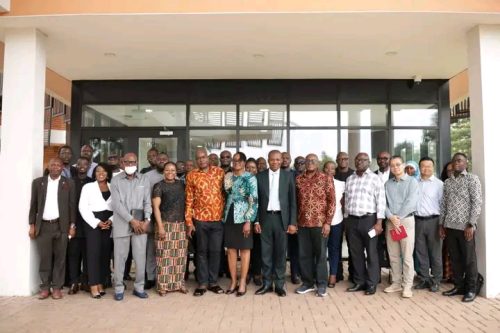

The Managing Director of ARB Apex Bank, Mr. Alex Kwasi Awuah, has underscored the strategic necessity for Rural and Community Banks (RCBs) to upgrade their digital infrastructure to maintain relevance and resilience in Ghana’s evolving financial ecosystem.


Delivering the keynote address at the 24th Annual National Conference of RCB CEOs, Mr. Awuah emphasized that digital transformation is no longer optional, but a core pillar of operational sustainability, risk mitigation, and inclusive banking.


The conference, held in Takoradi under the theme “Bridging the Gap: Empowering Rural Banking in a Digital Economy,” convened leaders from all 147 RCBs across the country to discuss systemic reforms, digital strategy alignment, and ecosystem collaboration.

Digital Financial Inclusion as a Strategic Imperative
Mr. Awuah noted that RCBs must transition from legacy banking models to technology-driven service delivery channels such as Agency Banking, Mobile Banking, and Internet Banking, to remain competitive and expand rural financial inclusion.

“Digital financial inclusion is a game of scale and reach. The more individuals and MSMEs we onboard through tech-enabled platforms, the more viable our banking model becomes,” he said.
He stressed that RCBs need to adopt a phased digital transformation roadmap, encompassing infrastructure investment, system interoperability, cybersecurity enhancement, and data analytics to drive growth and deliver services efficiently.
Performance Metrics and Sector Resilience
Highlighting the sector’s performance, Mr. Awuah disclosed that as of June 2025:
Total assets of the RCB sector reached GHS 21.2 billion
Customer deposits totaled GHS 18.2 billion
Profit before tax recorded GHS 783 million, a 117% increase year-on-year from GHS 361 million in June 2024
Capital Adequacy Ratio (CAR) improved from 9.85% in December 2023 to 18.35%, surpassing regulatory thresholds
These figures reflect strong sectoral performance, but Mr. Awuah cautioned that sustaining such growth requires digital scaling, improved operational efficiency, and enhanced risk frameworks.
FinTech Integration and Cost-Effective Deployment
In a presentation on behalf of the Bank of Ghana (BoG), Mercy Amoah Benin, Deputy Director of the Financial Institutions Supervision Department, highlighted increasing integration between FinTechs and traditional financial service providers.
She referenced BoG’s FinTech sector data, which indicates growth in:
Peer-to-peer interoperability,
Merchant acceptance of digital payments, Third-party API integration.
“RCBs no longer need to build proprietary systems from scratch. Instead, they can integrate with licensed Payment Service Providers (PSPs) and FinTech platforms via existing APIs, reducing CapEx and accelerating time-to-market,” she explained.
This modular approach allows RCBs to deploy scalable digital solutions such as digital wallets, real-time payments, and remote KYC onboarding, while focusing on core banking functions.
Regulatory and Institutional Support
Alhaji Hayatudeen Awudu Ibrahim, President of the RCB CEOs Group, commended the Ministry of Finance and Bank of Ghana for fostering a secure, innovative, and inclusive regulatory environment that enables rural banks to participate meaningfully in Ghana’s digital financial ecosystem.
He emphasized that digital transformation is most effective when approached through sector-wide collaboration, data standardization, and shared infrastructure models.
Building the Digital Core
As Ghana’s financial services sector becomes increasingly digital-first, RCBs must evolve into digitally native institutions, supported by API-enabled platforms, robust core banking systems, and interoperable digital channels.
This shift is critical to ensuring not just compliance, but also operational efficiency, customer satisfaction, and financial inclusion across rural and underserved communities.

Enock Akonnor is an experienced Ghanaian journalist, based in Kumasi and currently serves as the CEO and Managing Editor of www.leakyghana.com.
With a wealth of expertise built over many years in the media industry, he has earned a solid reputation as one of Ghana’s most sought-after journalists.
Contact:
📞 +233 541 921 562
✉️ enockakonnor2013@gmail.com








